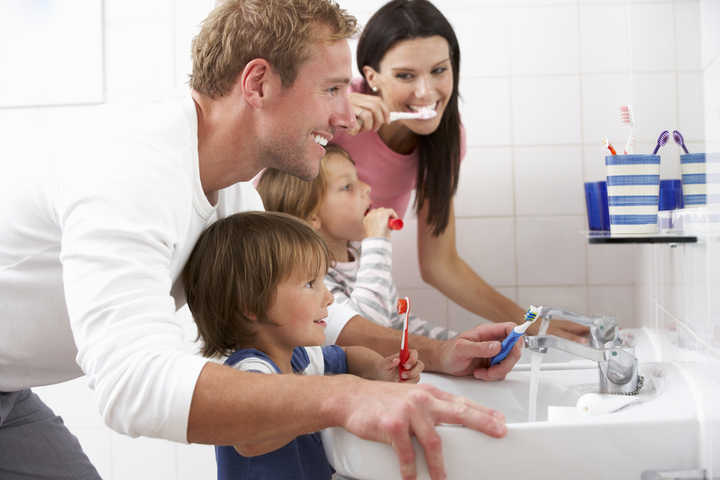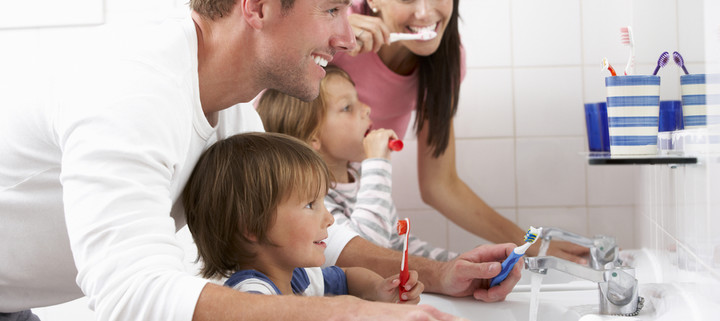How Often Should You Brush Your Teeth?

The standard that many people grew up hearing from their dentist is “Brush twice a day.” But when should you brush? What if you can only brush one time – when should you do it to be most effective? If twice is good then would four times be better? Is there a bad time to brush?
Our basic advice – Brush twice a day for two minutes each time.
To make things a little more clear we have some additional tidbits for you to keep in mind.
The Culprits –
- Sugary foods, especially sticky or liquid varieties that coat your teeth, is food for bacteria. As the bacteria metabolize the sugar they produce acids that lead to gum disease and cavities.
- Acidic foods are just as detrimental to teeth for the same reasons as sugary foods. Except they’re acidic from the very beginning.
Did you know that the pH of a diet soda is about the same as household vinegar?
The Problem –
Eating or drinking something acidic lowers the pH of a mouth and it can take a long time for it to return to normal. Acid demineralizes your teeth and weakens the tooth surface, leaving it vulnerable to decay.
The Exacerbation –
Brushing your teeth while your mouth’s pH level is too low can actually cause more damage. Your toothbrush and toothpaste are abrasive and will etch your weakened tooth surface even more. Waiting at least thirty minutes will allow your saliva to stabilize your pH.
Your toothbrush can cause more damage just by how it’s made. Nylon threads are sliced to make an even row of bristles, but the cut leaves a very jagged edge on the bristles. Most high quality toothbrushes will undergo another step that softens the edges into domes. The rounded edges are far less abrasive on your teeth but just as effective at removing debris. Even if your toothbrush had rounded edges when you took it out of the package, regular use will cause them to get worn back, jagged, and split – making them more abrasive. When you start noticing your toothbrush getting worn go ahead and replace it. If you wait until the bristles are splayed then it’s too late.
The Alternatives –
- Rinse your mouth with water. This will help restore your mouth’s pH to a normal level. R
- Rinsing with an antibacterial mouthwash will help to prevent plaque from producing more acids which is a big step in keeping your pH levels balanced as well.
- Chew some cheese. Chewy things will make you salivate, and the proteins in your saliva help to block the acids. And the chemicals that naturally occur in cheese help to re-mineralize teeth.
Having a little cheese with your wine is good for your health! - Sugarless gum is another great option. Again, the chewing action stimulates your saliva production which, in turn, helps to balance your mouth’s pH. Some studies have also shown that Xylitol, a sweetening agent, has properties that prevent cavities.
The Timing –
Bedtime is the most critical time to brush your teeth. You salivate less at bedtime which allows bacteria and acids to spend more time weakening your tooth surface. If you brush before bed then you’ll be reducing the number of culprits that can damage your teeth.
So to answer our earlier questions – You should brush before bedtime and thirty minutes after eating a sugary or acidic mea. If you can only brush once, brush before bed. Brushing more often is not necessarily better because you could potentially be weakening your teeth. The worst time to brush is after eating or drinking something acidic – rinse with water instead.
We want to see you every six months for your regular visits, but we’d prefer not to tell you that you need fillings or worse. Call us to schedule an appointment!
Here’s a little cheat sheet –
Brush 2x a day.
Brush for at least 2 minutes each time.
If you can only brush once, brush at bedtime.
Rinse with water after sugary or acidic foods.
Use new, good quality brushes.

